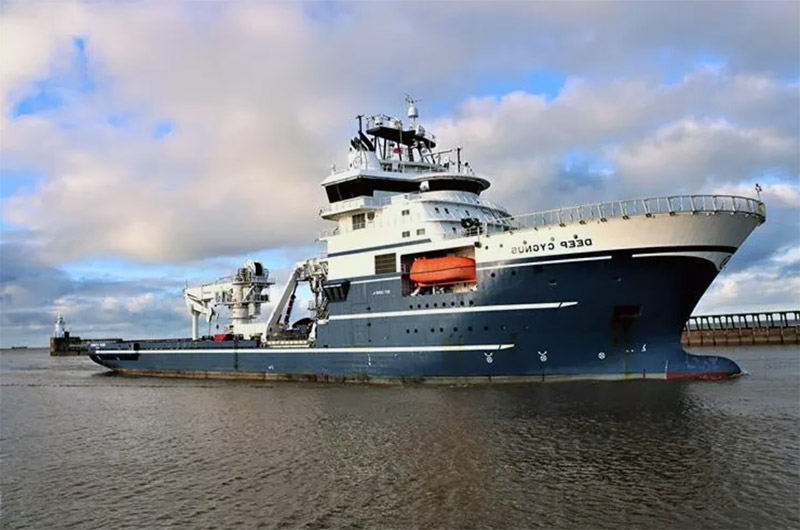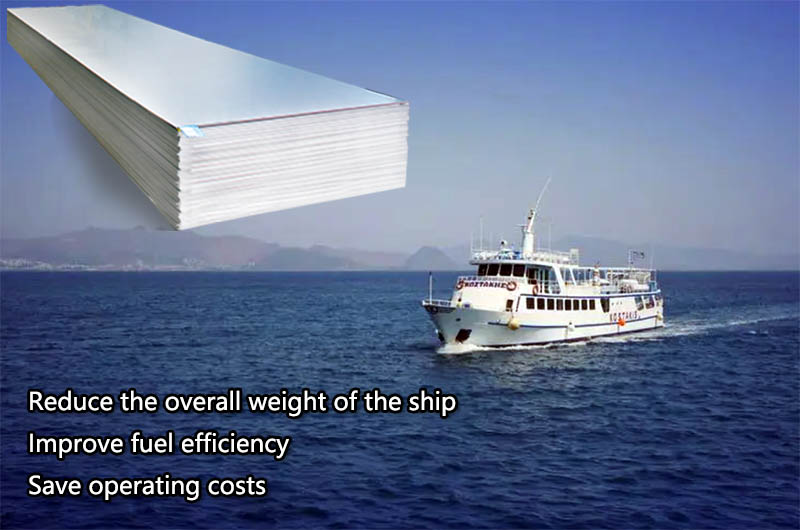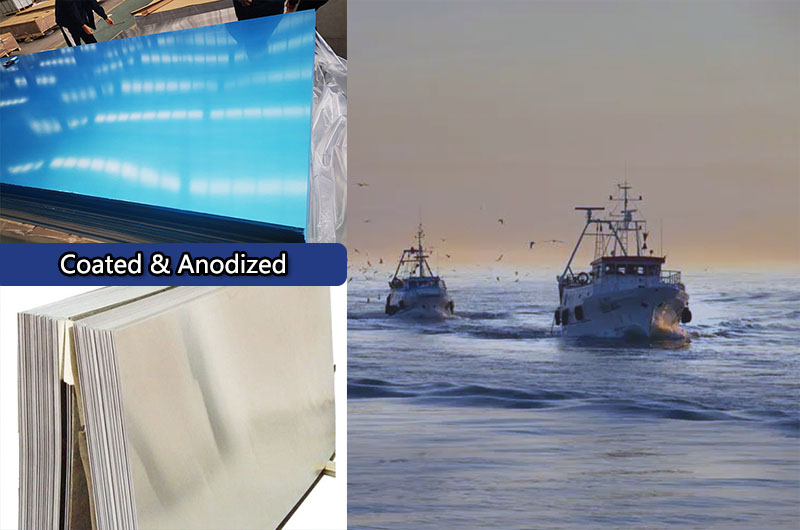The main problem in saltwater environments is corrosion. Salt water is very corrosive and it accelerates the corrosion process. Therefore, it is very important to choose an aluminum plate with excellent corrosion resistance.
Aluminum is naturally resistant to corrosion due to the formation of a thin oxide layer on its surface. Aluminum alloys with excellent corrosion resistance, such as marine grade alloys such as 5052, 5083 or 6061.

Aluminum Properties in Salt Water Environments
Aluminum is often chosen for boat decking in saltwater environments because it offers several advantages:
- Lightweight: Aluminum is a lightweight material compared to steel. This feature is particularly advantageous for shipbuilding as it helps to reduce the overall weight of the ship. Lighter ships require less propulsion energy, increasing fuel efficiency and saving operating costs.
- Corrosion Resistance: Aluminum naturally forms a protective oxide layer on its surface, providing inherent corrosion resistance. This oxide layer acts as a barrier, protecting the underlying aluminum from saltwater corrosion.
- Strength-to-weight ratio: Aluminum alloys used in shipbuilding have an excellent strength-to-weight ratio. This means that aluminum can provide sufficient strength while keeping the weight of the ship low. It allows for the construction of lightweight structures capable of withstanding the harsh marine environment.
- Formability: Aluminum is highly formable, meaning it can be easily formed and machined into the shapes required for boat construction. This formability allows for the creation of complex and efficient designs, optimizing space utilization and improving the overall performance of the vessel.
- Maintenance and Repair: Aluminum is relatively easy to maintain and repair. Its corrosion resistance reduces the need for frequent maintenance, and if damage occurs, aluminum structures can be repaired or replaced more easily than other materials such as steel.
- Recycling potential: Aluminum is a highly recyclable material that meets sustainability goals. At the end of a ship's life cycle, aluminum components can be recycled, reducing environmental impact and contributing to a circular economy.

NOTE: Aluminum is not suitable for all boat building applications. It may not be the first choice for larger vessels or structures requiring extreme strength or resistance to impact damage. In such cases, other materials such as steel or composite materials may be more suitable. Specific requirements, trade-offs, and consultation with marine architects and engineers must be considered to determine the best material selection for a particular marine application.
Marine Aluminum Alloy in Salt Water Environment
Different aluminum alloys have different levels of strength, formability, and corrosion resistance. Marine grade alloys designed for saltwater applications are the most suitable. Alloys such as 5052, 5083 and 6061 are commonly used in marine environments for their corrosion resistance and strength.
- 5083 Marine Aluminum Alloy: 5083 aluminum alloy is highly corrosion resistant and designed for marine environments. It has excellent saltwater corrosion resistance, making it a popular choice for hulls, decks and other marine structures.
- 5052 Marine Aluminum Alloy: 5052 aluminum alloy also provides good corrosion resistance in saltwater environments. It is commonly used in marine applications including hulls, tanks and structural components.
- 6061 Marine Aluminum Alloy: Although 6061 aluminum alloy is not specifically designed for marine environments, 6061 alloy has good corrosion resistance in salt water. It is commonly used in marine fittings such as rails and handles, as well as other non-structural marine applications.
While these alloys exhibit good corrosion resistance, proper surface preparation and regular maintenance are still critical to ensure their long-term performance in saltwater environments. Additionally, factors such as water temperature, salinity levels, and exposure to other environmental elements can affect the corrosion resistance of aluminum alloys.
How to Treat the Surface of Marine Aluminum Plate in Salt Water to Increase its Corrosion Resistance?
Answer: Appropriate surface treatment of marine aluminum plates can further enhance its ability to resist salt water corrosion. Common treatments include:
- Anodizing (forms a protective oxidation layer on the surface)
- Apply a corrosion-resistant coating
These treatments provide an additional barrier against salt water and extend the life of the panels.
Anodizing : Anodizing is an electrochemical process that thickens the natural oxide layer on the aluminum surface. It forms a durable and corrosion-resistant layer called anodizing.
Anodizing improves the salt water corrosion resistance of aluminum by increasing the thickness and hardness of the protective oxide layer. It also offers options for coloring and aesthetic enhancements.
Protective Coating: Applying a protective coating, such as paint or powder coating, can also provide an additional barrier against corrosion. These coatings act as a physical barrier between the aluminum surface and the corrosive saltwater environment.
Coatings should be specifically designed for marine applications and provide excellent adhesion, flexibility and resistance to salt water, UV radiation and abrasion.

Both anodizing and protective coatings can significantly enhance the corrosion resistance of aluminum panels in saltwater environments. The choice between these methods depends on factors such as the desired appearance, specific performance requirements, and budgetary considerations.
Considerations for Marine Aluminum in Salt Water
- Connection method: Pay attention to the connection method used for the aluminum plate. Make sure to use corrosion-resistant fasteners and compatible connection techniques to maintain board integrity and prevent galvanic corrosion.
- Insulation: When aluminum sheets are in contact with dissimilar metals such as stainless steel, proper insulation or the use of non-conductive materials such as gaskets or insulating coatings is important to prevent galvanic corrosion.
- Periodic Inspection: Periodically inspect the aluminum panels for any signs of corrosion, damage or loose connections. Address any issues promptly to prevent further deterioration and maintain board performance in saltwater environments.
- Plate Thickness: The thickness of the aluminum plate depends on the specific application and the loads it will withstand. Thicker sheets generally improve strength and durability, but also add weight. Evaluate structural requirements and weight limitations to determine the right thickness for your application.
- Application Details: Consider the specific conditions of your saltwater application. Factors such as temperature, salinity, water flow, and exposure to other environmental factors can affect the performance and longevity of aluminum panels. Consulting an expert or engineer with experience in marine applications can provide valuable insight.
- Maintenance and Maintenance: Regular maintenance and proper care are essential to prolong the life of aluminum panels in saltwater environments. After exposure to salt water, rinse the board with fresh water and periodically inspect and repair any signs of damage or corrosion.
- While aluminum has good corrosion resistance, it may not be suitable for all salt water applications. Other factors, such as the size of the vessel or structure, budget constraints, and specific performance requirements, may also influence material selection.
NOTE: While aluminum has good corrosion resistance, other materials such as stainless steel or fiberglass may also be suitable for some saltwater applications. Consider specific requirements and consult an expert to determine the best material for your needs.

